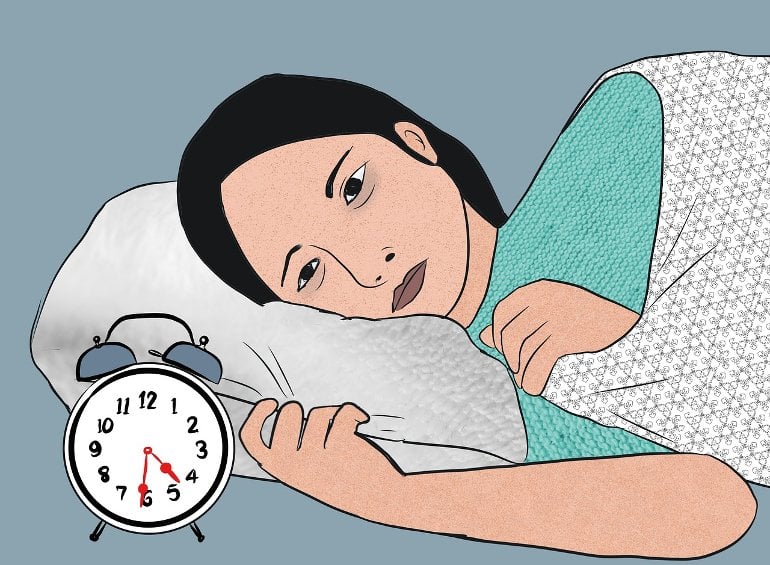Summary: Suffering from sleep-related disorders such as OSA or insomnia was associated with up to seven years worth of heightened risk for cardiovascular disease and decreased mortality, a new study reports.
Source: University of Sydney
Poor sleep could lead to between two and seven years worth of heightened heart disease risk and even premature death, according to a new study led by researchers at the University of Sydney in collaboration with Southern Denmark University.
The study analyzed data from more than 300,000 middle-aged adults from the UK Biobank and found that different disturbances to sleep are associated with different durations of compromised cardiovascular health later in life compared to healthy sleepers.
In particular, men with clinical sleep-related breathing disorders lost nearly seven years of cardiovascular disease-free life compared to those without these conditions, and women lost over seven years. Importantly, even general poor sleep, such as insufficient sleep, insomnia complaints, snoring, going to bed late, and daytime sleepiness is associated with a loss of around two years of normal heart health in men and women.
“Anyone who’s had a few rough nights of sleep knows how it can lead to bad mood and not feeling one’s best. Our research shows that, over time, regular poor sleep can lead to significantly compromised cardiovascular health in middle and old age,” said Professor Emmanuel Stamatakis from the Charles Perkins Center and Faculty of Medicine and Health, senior author of the paper in BMC Medicine.
“Sleep apnea is well known to increase the risk of cardiovascular disease and other chronic conditions, but these findings are a wake-up call that poor sleep in general can pose significant risk to heart health.”
How does snoring affect long term health?
The team used an established composite sleep score comprising self-reported sleep duration, insomnia complaints, snoring, daytime sleepiness and whether the person was a night owl or an early bird to come up with three sleep categories: poor, intermediate, and healthy at age 40, and compared this with their overall cardiovascular disease-free health expectancy.
By combining the study participants’ self-reported data with clinical data from their doctors in the two years preceding the study, the researchers were able to compare health outcomes for self-reported sleep patterns and clinically diagnosed conditions such as sleep-related breathing disorders. The team categorized participants as poor, intermediate, and healthy sleepers at age 40, and compared their health outcomes at old age.
Women with poor sleep were likely to experience two years more of compromised cardiovascular health compared to healthy sleepers, while men experienced more than two years. Intermediate sleepers lost almost one year of heart disease-free life among women, and men lost slightly more.

This means that snoring and trouble falling asleep or staying asleep can be a warning sign of potential health issues in the future.
“While the average life expectancy of the UK study participants is around 80 years, people with clinically diagnosed sleep-related breathing disorders like sleep apnea lost over seven years of cardiovascular-disease free life,” said the study’s lead author Dr. Bo-Huei Huang, an epidemiologist recently graduating from the Charles Perkins Center and Faculty of Medicine and Health.
A wake-up call for health and policy
Professor Peter Cistulli, the ResMed Chair of Sleep Medicine at the Charles Perkins Center and Royal North Shore Hospital, said that these findings are significant because they extend the findings of previous studies linking poor sleep to important health outcomes.
“Sleep is a vital biological function that has been under-appreciated in public health policy to date. It’s gratifying that these findings shine a light on the importance of sleep, and the need for it to be recognized as a pillar of good health, alongside physical activity and nutrition. The time is right to ensure that sleep is recognized in public health policy,” said Professor Cistulli.
About this sleep and cardiovascular health research news
Author: Press Office
Source: University of Sydney
Contact: Press Office – University of Sydney
Image: The image is in the public domain
Original Research: Open access.
“Influence of poor sleep on cardiovascular disease-free life expectancy: a multi-resource-based population cohort study” by Bo-Huei Huang et al. BMC Medicine
Abstract
Influence of poor sleep on cardiovascular disease-free life expectancy: a multi-resource-based population cohort study
Background
The complexity of sleep hinders the formulation of sleep guidelines. Recent studies suggest that different unhealthy sleep characteristics jointly increase the risks for cardiovascular disease (CVD). This study aimed to estimate the differences in CVD-free life expectancy between people with different sleep profiles.
Methods
We included 308,683 middle-aged adults from the UK Biobank among whom 140,181 had primary care data linkage. We used an established composite sleep score comprising self-reported chronotype, duration, insomnia complaints, snoring, and daytime sleepiness to derive three sleep categories: poor, intermediate, and healthy. We also identified three clinical sleep disorders captured by primary care and inpatient records within 2 years before enrollment in the cohort: insomnia, sleep-related breathing disorders, and other sleep disorders. We estimated sex-specific CVD-free life expectancy with three-state Markov models conditioning on survival at age 40 across different sleep profiles and clinical disorders.
Results
We observed a gradual loss in CVD-free life expectancy toward poor sleep such as, compared with healthy sleepers, poor sleepers lost 1.80 [95% CI 0.96–2.75] and 2.31 [1.46–3.29] CVD-free years in females and males, respectively, while intermediate sleepers lost 0.48 [0.41–0.55] and 0.55 [0.49–0.61] years. Among men, those with clinical insomnia or sleep-related breathing disorders lost CVD-free life by 3.84 [0.61–8.59] or 6.73 [5.31–8.48] years, respectively. Among women, sleep-related breathing disorders or other sleep disorders were associated with 7.32 [5.33–10.34] or 1.43 [0.20–3.29] years lost, respectively.
Conclusions
Both self-reported and doctor-diagnosed poor sleep are negatively associated with CVD-free life, especially pronounced in participants with sleep-related breathing disorders.






